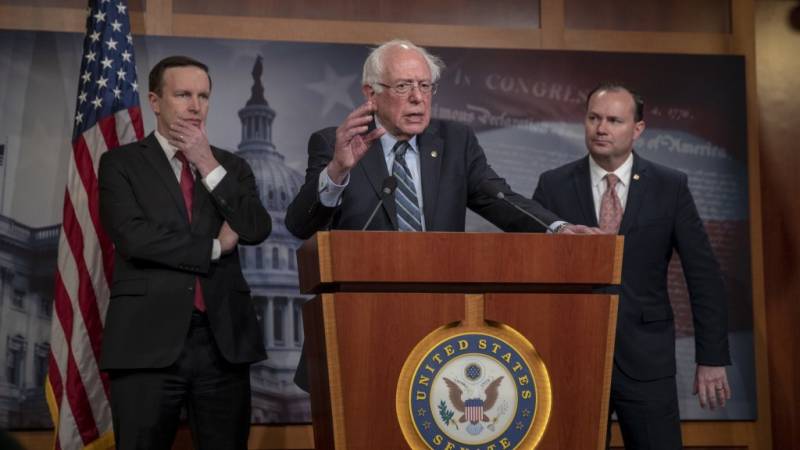S.J. Resolution 54, "a joint resolution to direct the removal of United States Armed Forces from hostilities in the Republic of Yemen that have not been authorized by Congress," passed the US Senate on Thursday afternoon.
The chamber voted back to back on two resolutions related to Saudi Arabia: one to end US support for the kingdom's war in Yemen and a second to hold Saudi Arabia's Crown Prince Mohammad bin Salman responsible for the murder of Washington Post columnist Jamal Khashoggi. The latter, in particular, is seen as a reprimand to US President Donald Trump for his noncommittal stance on the crown prince's involvement in the death and cover-up.
The Senate voted unanimously to condemn the crown prince for the columnist's murder.
The final vote on the bill to end support for the war in Yemen was 56 voting in favor, 41 against. The resolution needed a simple majority to squeak through.
Technically, Congress never authorized the use of the US military in Yemen, though for years US forces refueled Saudi vessels engaged in the conflict and provided targeting information for Saudi bombers. US special forces also aided Saudi forces on the ground near the Yemen border.
The resolution forces Trump to withdraw any US forces involved in the conflict within 30 days.
Senator Bob Corker, a Tennessee Republican who chairs the Senate Committee on Foreign Relations, told reporters this week the move is "a strong denouncing of a crown prince and holding [him] responsible for the murder of a journalist. It's a pretty strong statement for the United States Senate to be making, assuming we can get a vote on it."
Corker is also fighting for a one-year ban on weapons sales to Saudi Arabia, which could be included as an amendment to another bill, The Hill reported. Corker and Senate Democrats are still negotiating whether this will pan out, however.
"I am optimistic that a bipartisan coalition of senators will vote to make clear that the United States will no longer support Saudi Arabia's despotic regime in its incredibly destructive war," said Senator Bernie Sanders, an Independent from Vermont and a potential 2020 presidential candidate.
The resolution stipulates that the White House must withdraw any US military forces in Yemen unless they are engaged in operations against Al-Qaeda, the president makes a new request for troops in Yemen and Congress authorizes the request, or Congress passes a declaration of war or a bill authorizing the use of military force in Yemen.
As the text of the legislation points out, "no specific statutory authorization for the use of the United States Armed Forces with respect to the conflict between the Saudi-led coalition and the Houthis in Yemen has been enacted, and no provision of law explicitly authorizes the provision of targeting assistance or of midair refueling services to warplanes of Saudi Arabia or the United Arab Emirates that are engaged in such conflict."
According to an internal Pentagon memo, the US Department of Defense has not been properly charging Riyadh for refueling services and jet fuel during the Saudi campaign against Yemen, an oversight attributed to "errors in accounting." That's meant US taxpayers paying out tens of millions of dollars to refuel Saudi coalition jets attacking Yemen so far, according to estimates.






